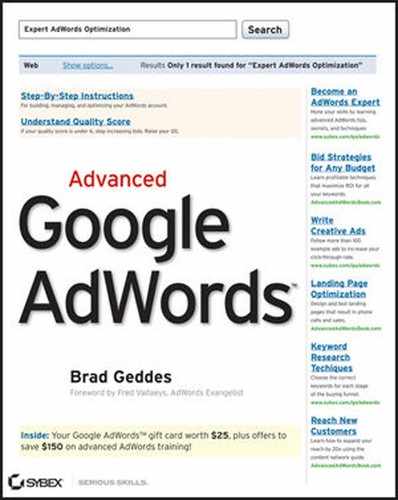Understanding Attribution Management
Each of the bidding techniques we examined set bids based on the conversion rate of a keyword or ad group. AdWords conversion tracker only applies a conversion value to the last keyword, ad group, ad copy, and landing page clicked from your AdWords account.
For example, if someone clicked on your ad yesterday for the keyword “MP3 player,” looked at your website, but did not convert, and then that same user saw your ad today for the keyword “16GB iPod touch,” clicked it, and then converted on your website, what metrics would show in your AdWords account?
Both keywords would show that they received a click and incurred costs. However, only the last keyword clicked, “16GB iPod touch,” would show a conversion in your AdWords account. Each time a user clicks on your ad, Google overwrites the conversion tracking code cookie. Therefore, Google AdWords conversion tracker is known as a last keyword clicked attribution management system.
To make matters more complicated, Google Analytics associates goals with the last entrance to the website. Therefore, if someone clicks on your ad today, then comes back to your site directly tomorrow and converts, Google Analytics will show that a direct traffic entrance received the conversion, and yet Google AdWords will show the last keyword clicked in your account received the conversion.
It is common for searchers to start out with general phrases to learn more about a product. As they learn more, their search becomes more specific in their keyword selection. The search behavior mirrors the buying funnel. Let’s assume that you sell MP3 players and that a searcher did the searches shown in Figure 13-35; each time they clicked on your ad before finally purchasing from your company.
Figure 13-35: Search process before making a purchase

If you only bid by ROI or by profits, technically only the last keyword, “16GB iPod touch,” would have a bid higher than zero. As the other keywords did not have a conversion associated with them, they did not bring ROI to your account and therefore are costing you money. However, are they really costing you money? Or is it that the searcher first became engaged with your company after searching for “MP3 Player” and the only reason they kept clicking on your ads before finally purchasing was that you helped them learn more about MP3 players after their very first click?
In this scenario, if you deleted all of the words except for “16GB iPod touch” you might find that your total conversions drop significantly. While your ROI would probably go up, as ROI is only a percentage, your total revenue and profits would most likely drop. In these cases, what do you do? You have two options.
The first is to use an attribution management system. There are third-party vendors that will track each of these clicks and tell you which keywords did not convert but originally brought a searcher to your site who converted at a later time. You could also build such a system in-house, but if you do, be prepared to invest some time and money. Even using a sophisticated third-party system is not cheap. If you do not have the money to invest right now, there is a second solution you can employ.
Take the keywords that are not receiving conversions, yet you feel really are good keywords for your company to bid on, and put them in a Budget Optimizer campaign as discussed earlier in the section “AdWords Bidding Options.”
If you would like to use metrics to determine what keywords should be placed into a Budget Optimizer account, examine bounce rates, average page views, and goal conversions in Google Analytics for each keyword. If you see keywords that are leading to high interaction on your website, but those keywords are not converting and are early buying funnel keywords, then add the words to the Budget Optimizer campaign.
Attribution management is a buzz phrase that will receive more exposure in the future. If you buy banner ads and they seem to not lead to conversions, then your wallet will tell you that you should stop buying those ads. However, if you have data that shows you that when someone sees your banner ad your conversion rate for search increases for those individuals, you might have a different opinion on those banner ads. Multiple marketing channels do affect each other. Cross-channel attribution management will only continue to increase in sophistication over the coming years.
